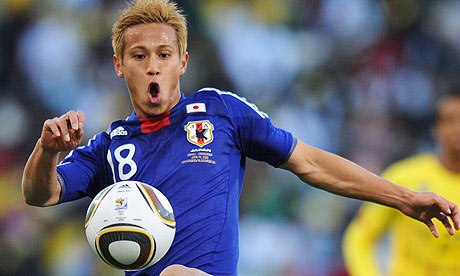
There is no need for English football to brace itself for a post-World Cup stampede. Not so long ago the biggest sporting event on the planet would have been expected to drive the English transfer market, but it is a measure of just how much football has changed that financial experts are talking about the spending power of a single club being more influential this summer than the efforts of the players in South Africa.
Manchester City's extraordinary wealth makes it impossible to forecast how many millions will be spent in the Premier League between now and the end of next month – should the world's richest club make several domestic signings conservative forecasts could be shattered – but what can be said with a degree of confidence is that across the Premier League we are unlikely to see a dramatic increase in transfers because of the World Cup.
One glance at the list of players signed after the 2006 finals reveals just how little impact that tournament had on the English market. Excluding those who moved within England, there were only eight permanent transfers involving World Cup players and four loans, including the illegal deal that took Carlos Tevez and Javier Mascherano to West Ham United. Of the foreign imports, only Antonio Valencia, who joined Wigan on loan from Villarreal, proved to be an unqualified success, highlighting the dangers of judging a player on the basis of one tournament (Liverpool's £10m outlay on El Hadji Diouf after the 2002 finals comes to mind).
The lack of activity following Germany 2006 is expected to be repeated this year and there are several reasons, ranging from the theory that the World Cup was a slow burner that never really ignited to the reality that most of the top stars, like Internazionale's Wesley Sneijder and Barcelona's David Villa, are simply out of reach. But perhaps the most important factor is that the extensive scouting networks at most clubs mean the days have long gone when players first come to their attention at major tournaments.
"Historically, we generally have seen increased activity in a World Cup year. However, I think, it's much more questionable this year," said Alan Switzer of Deloitte. "The World Cup used to be somewhere where you would expect lots of players who maybe weren't that heralded to come through as stars, and that's what would drive the increased activity post-World Cup. I think it's fair to say there are fewer less-exposed players. Throw in the fact that many people have also said it's been a reasonably disappointing tournament in terms of the standard of play, and the World Cup is unlikely to be a major factor in the transfer window this year."
Most clubs pursuing World Cup players tried to get deals done before the finals, rather than risk prices being inflated afterwards, although not everyone was as successful as Manchester United, who signed Javier Hernández before he scored two goals for Mexico in South Africa. One of Hernández's team-mates, Pablo Barrera, was available for as little as £1.9m in May but his valuation was hiked to nearer £4.5m in the space of a few weeks as Everton, Celtic and a host of European clubs competed with West Ham for the winger's signature.
Manchester City, who were working on deals for Yaya Touré, Jérôme Boateng and David Silva before the World Cup started, now face a similar problem to West Ham in their pursuit of Benfica's Fábio Coentrão, after the left-back excelled for Portugal. Others likely to attract interest from English clubs include Ghana's Anthony Annan, the Japanese forward Keisuke Honda and the USA's Michael Bradley, yet with all three already playing their club football in Europe none of them are likely to come cheaply.
Indeed, David Baldwin, a football agent who represents several of the South American players who were at the World Cup, believes that the members of the Uruguay side that reached the semi-finals yet still play their club football either at home or in neighbouring countries could represent the best value for money.
"I think the ones who might have surprised people are the holding central midfielder [Arévalo] Ríos, who I thought was outstanding and plays for Peñarol in Uruguay, and Mauricio Victorino, the centre-back who plays for Universidad in Chile," said Baldwin. "I think people will look at them and say, 'Wow. How good are they?' Scouts will have known them beforehand but often you are unsure what level they can play at until you put them on the grand stage. So while clubs might know all the players, there are still bargains to be had out there."
Bargain is not a word readily associated with the richest league in the world but there were signs last year, when Deloitte noted that Premier League spending dropped from £525m in 2008 to £450m, that the economic climate was starting to bite. "We would be surprised, with one qualification, if that figure wasn't probably a bit lower again this year," added Switzer. "The qualification, obviously, is what Manchester City will do. It's quite important whom Manchester City spend the money with. Last year, because they bought quite a few players from the Premier League that money was recycled in the Premier League. But to date that hasn't happened this year."

